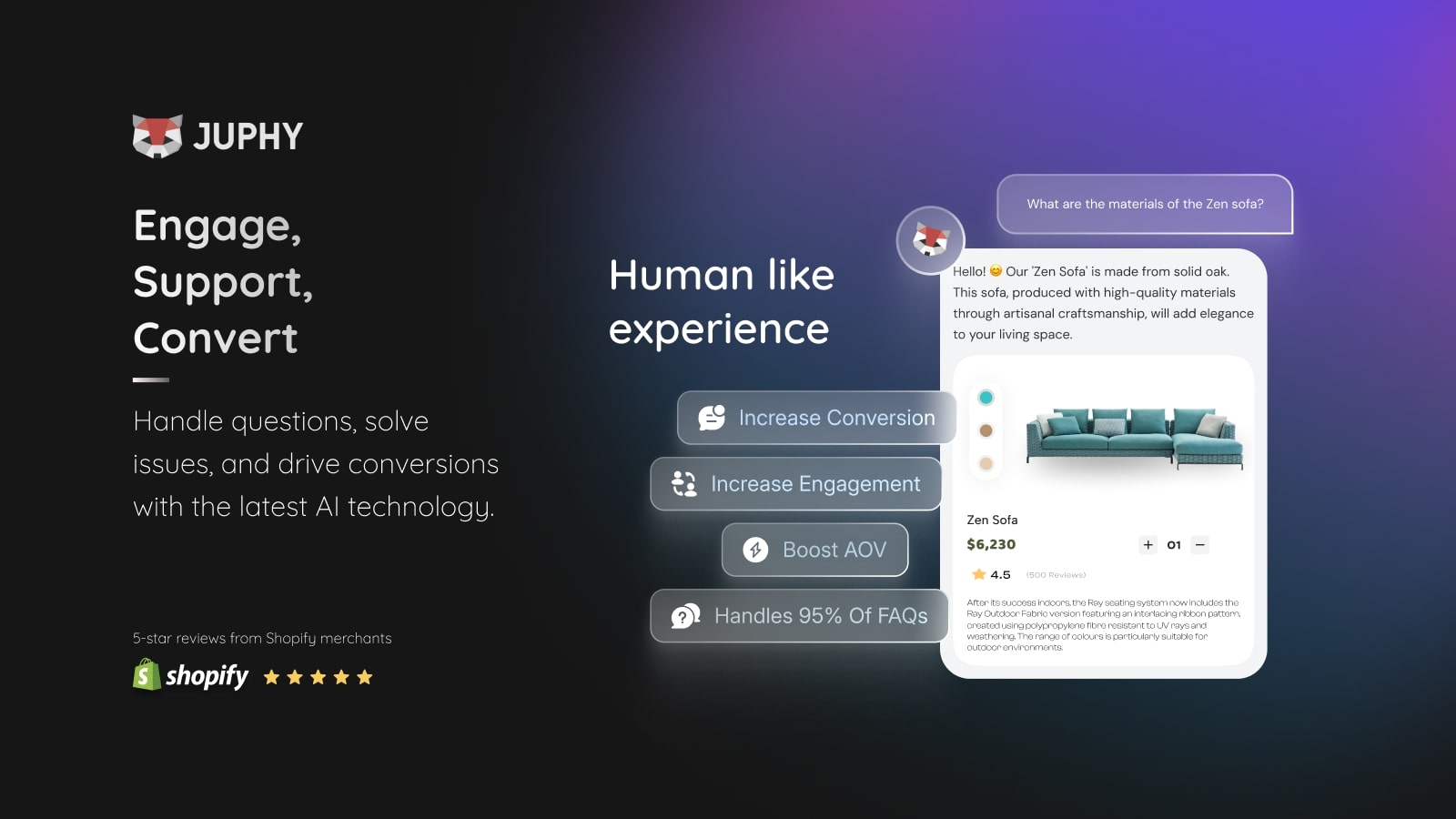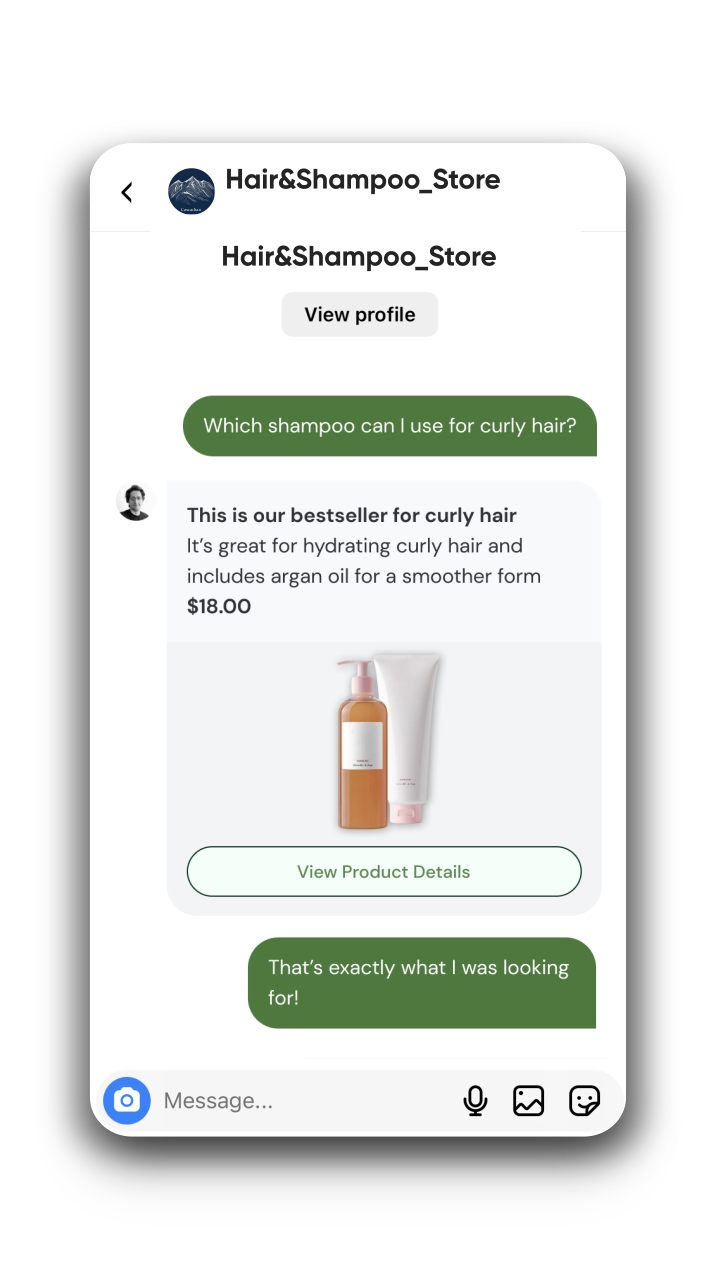Chatbot Marketing: Your Secret Weapon for More Shopify Conversions
Inci Vardar
Are you one of those shop owners who think that the sales performance could have been better if they had more human resources and extended business hours? You are right because you are losing quite a portion of your customers who visit your online store after hours. If we also take the customers you cannot reach during busy shopping periods into account, it is safe to assume that you are well below the figures you can actually earn. But this problem is really easy to tackle with chatbot marketing, your secret weapon for more Shopify conversions.

How Chatbots Entered the Sales Arena
Just a few years ago, customers were reluctant to have conversations with machines instead of humans, and businesses were skeptical about investing in such a technology because the chatbots simply weren’t smart enough. But with cutting-edge machine learning and natural language processing capabilities, the modern chatbots can interact with customers almost like humans and streamline the shopping experience like never before. Conversational AI’s ability to understand the context and detect emotions made chatbots more “likable”, and as a result, businesses are increasingly embracing the technology in different areas of their operations. Marketing is one of those areas in which businesses benefit from chatbots in order to drive engagement, increase sales, and elevate brand perception.
The Power of Chatbot Marketing
Today chatbots are a powerful asset in marketing operations with their personalized recommendations and round-the-clock services. 2024 stats suggest that digital assistants have proven to be instrumental in driving business success, with 55% of companies reporting an increase in high-quality leads. In certain industries, chatbots boast conversion rates as high as 70%. Moreover, business leaders have witnessed a notable 67% surge in sales attributed to the integration of chatbots into their operations.

The Basics of Chatbot Marketing
Before delving into successful examples and benefits of implementing chatbots to your business operations, it would be useful to explain the conversational AI technology behind the new generation of chatbots and how they became a game-changer for e-commerce.
What Are Chatbots and How Do They Work?
Chatbots are AI-powered assistants designed to engage customers in natural conversations across multiple channels, facilitating a seamless shopping journey. They are capable of recognizing patterns in conversations, delivering prompt and accurate responses to customer inquiries in real-time, utilizing data to personalize the experience, and integrating sales techniques into conversations to drive conversions.
Unlike the earlier models that relied on previous data to create rules, conversational chatbots have advanced algorithms for machine learning and natural language processing. While acquiring data from various sources, they learn through training and expand their knowledge through interaction. This enables them to continuously refine their understanding and ensure customer interactions that resonate with your brand’s identity and values.
Why Chatbots Are a Game-Changer for E-Commerce
E-commerce allowed consumers to shop at their convenience, but until recently, it couldn’t provide the same kind of accessibility or quality 24/7. Automation worked to a degree for marketing and sales purposes, but the human touch that cultivated dialogue was either missing or too expensive to scale. Today, businesses from diverse industries are able to meet customer demands around the clock in a very cost-effective manner without needing additional workforce or complicated system alterations. Utilization of chatbots increased customer satisfaction with their efficiency and personalization abilities while cutting down some of the related expenses. This made chatbots a game-changer for the competitive world of e-commerce, where you risk losing 50% of your customers without a 24/7 online shopping assistant.

Chatbots and Shopify: A Perfect Match
Famous for its simplicity and a wide variety of interactions, Shopify makes it easy to implement chatbots in your marketing and sales operations. Numerous Shopify-compatible chatbots are available in the Shopify App Store, with options like Juphy’s AI Agent offering seamless deployment with just a single click.
Integrating Chatbots with Your Shopify Store
While integrating chatbots with your Shopify store is easy, you should follow these steps to make the most of your investment and create engaging experiences for your customers.
- Build your chatbot strategy: Whether you’ll use a rule-based chatbot or an AI-powered one, the channels it will be deployed on, the main issues that your chatbot will solve, and a variety of other decisions all depend on your business objectives. By pinpointing the stages of the customer journey that lead to conversions and identifying pain points, you can tailor your chatbot’s functionalities to meet the needs of your target audience effectively.
- Train your chatbot: While some chatbots like Juphy AI scan your entire website in minutes and obtain all relevant data, as well as your brand’s tone of voice, some require detailed scripts for different scenarios. Train your chatbot to match your brand personality, choosing the right words and phrases to ensure consistency. Remember that the more it is used, the faster it will evolve towards your preferences, in addition to customer satisfaction.
- Offer a hybrid approach: You may discover some friction in the sales funnel stages while building your strategy. While some of those tricky areas can be improved with chatbots, some require human assistance. By seamlessly integrating your team members into the process, you ensure that customers receive the personalized support and expertise needed to navigate complex issues or make critical decisions.
Examples of Successful Chatbot Applications on Shopify
As mentioned before, there’s a variety of rule-based or advanced AI-powered chatbots in the Shopify App Store. Juphy’s AI Agent, Zendesk Chat, Tidio, Zowie, and DeepConverse are among the popular chatbot providers. They help businesses thrive by driving conversions and enhancing customer experience through a series of data-driven applications.
Driving Conversions with Chatbots
Chatbots excel at driving conversions by engaging customers in personalized interactions, guiding them through the purchasing process, and addressing their inquiries in real time. This improves the chances of increased average order value and reduced cart abandonment rates. Chatbots drive conversions with 3 techniques:
- Personalized Product Recommendations
Chatbots are great shopping assistants that can remember every single customer’s unique preferences and personalize the shopping journey based on past interactions. By analyzing customer behavior and purchase history to personalize the shopping journey, they offer data-driven suggestions, recommend relevant products, apply upselling and cross-selling strategies into conversations, and enhance the chances of conversion. Such tailored recommendations not only lead to higher average order values but also foster repeat purchases.

- Streamlining the Shopping Process
When deployed, chatbots become an integral part of your system, and they can retrieve information much faster than your human agents. They save time and reduce shopping frustration by narrowing down the options with each new detail mentioned in the conversation, leading to a more informed selection process. Reaching the required information in seconds can accelerate the customer’s decision-making process effectively, which leads to improved satisfaction and conversion rates.
- Reducing Cart Abandonment Rates
Second thoughts or last-minute payment issues can result in cart abandonment. Chatbots help solve this issue by addressing potential obstacles during the checkout process. They provide real-time assistance to resolve queries, share personalized offers, or send personalized follow-up messages to encourage customers to complete their purchases.
Enhancing Customer Experience
Chatbots enhance the customer experience by providing the required assistance at the right time and completing their mission with attentive follow-up. While performing as tireless members of your marketing, sales, and support teams night and day, they create an interactive shopping environment through dialogue and make sure the experience is satisfactory for the customers.
- Providing Instant Customer Support 24/7: Chatbots can handle large volumes of inquiries within seconds, regardless of time zones or business hours. In the competitive domain of e-commerce, where speed determines customer preferences, time literally means money.

- Collecting Customer Feedback Effortlessly: Chatbots collect customer feedback through various means, including direct inquiries during or at the end of conversations and surveys. They can also utilize social media monitoring and sentiment analysis to collect feedback related to the brand, products, or industry trends.
- Creating an Interactive Shopping Environment: Chatbots engage customers in personalized and real-time conversations throughout their shopping journey. By offering assistance in product discovery and selection, providing recommendations based on individual preferences and previous purchases, and facilitating seamless transactions, they create an interactive shopping environment and enhance customer satisfaction.
Implementing Chatbot Marketing Strategies
If you are planning to integrate chatbots into your Shopify store, you need a solid chatbot marketing strategy to make the most of your investment. As mentioned before, your strategy should outline what you want to achieve with a chatbot and make the necessary optimizations to reach your goal. Of course, selecting the right technology is the first crucial step, in which you need to ensure that the chatbot is compatible with existing systems and offers capabilities for scalability.
Identifying Goals for Your Chatbot
Although chatbots effectively perform many operations to make your job easier and offer your customers a better shopping experience, you may not need all these functions. The functions of your chatbot will be directly linked to your target audience’s needs and pain points. When you truly know your target audience, you will also know where they interact with brands. Then, you can determine the platforms where your chatbot will interact with your customers, its tone of voice, and specific responses for different scenarios. Each step should contribute to the roadmap guiding you toward your ultimate goal, whether it’s generating leads, improving conversions, or retaining customers.
Optimizing Chatbot Performance with Training
Chatbots are fast learners, but they can never know the intricacies of your business like you do. That’s why you need to train your chatbot to refine its understanding of your brand values, tone of voice, and business objectives. The continuous learning process involves updating the knowledge base and algorithms, complemented by frequent usage. Since the chatbot learns from user interactions, frequent utilization enhances its adaptability to evolving customer needs.
While some chatbots require constant attention, some smarter ones, like Juphy AI, evolve with your Shopify store, updating all the new information automatically and ensuring it’s always in sync with your offerings.
Leveraging Juphy AI for Your Shopify Store
Making the perfect pair with Shopify, Juphy’s conversational AI chatbot offers the ultimate user-friendly experience for both shoppers and business owners. With its ‘Built for Shopify’ badge, you can directly access and manage it from the Shopify dashboard. After the one-click installation process, the chatbot scans your entire e-commerce website in seconds, gathers product information and policies, and adapts to your brand tone of voice perfectly.
You’ll see what a quick learner it is once you take it for a spin. The “Test your sales bot” feature enables you to directly experience the chatbot’s functionalities, ensuring alignment with your brand objectives. And if you want to change or optimize something, editing options are at your disposal in just a few clicks.
After learning all about your brand, Juphy AI starts gathering customer information upon every interaction and browsing history for your CRM system. Creating a rich history of visitor interactions, the chatbot helps you get a better understanding of customer behavior and refine your marketing strategies.
How Juphy AI Can Boost Your Chatbot Marketing
Every customer interaction with the chatbot is logged into the Juphy app and its Social Inbox feature, which provides detailed information on individual shopping journeys, including preferences, interests, and areas of improvement. Analyzing this data, Juphy’s AI Agent personalizes the shopping experience with relevant items, new arrivals, and special offers. This seamless journey has the potential to increase sales up to 10x, but Juphy AI’s operations start long before that.

Juphy AI chatbot serves your customers on social media as well. Instagram and Facebook integration allows it to keep track of every conversation, whether it’s a casual DM or a crucial sales lead from an ad comment. If you wonder how many visitors land on your Shopify store via social media, you can trace the footsteps of your customers right from that initial social DM to the final purchase with Juphy’s conversion tracking feature.

You can try Juphy for free; start your trial now!
Conclusion
Increasing competition and changing customer needs force businesses to find new solutions to operate and provide memorable experiences cost-efficiently. AI-powered chatbots respond to this need fittingly, offering state-of-the-art capabilities that streamline operations, enhance customer interactions, and drive sales. Chatbot marketing can be your secret weapon to drive more conversions on Shopify by providing personalized assistance instantly and creating convenient, interactive shopping environments.
Key Takeaways
- Chatbots stand as a turning point in marketing and sales, offering personalized recommendations and round-the-clock services that drive engagement and increase conversions.
- You might be losing about half of your customers without chatbot assistance, but implementing a solid chatbot marketing strategy accompanied by the right tools can result in exponential sales growth.
- Integrating a reliable chatbot into your Shopify store is a user-friendly and cost-efficient way to enhance customers’ shopping experience.
- Leveraging advanced chatbot features like CRM integration and social media tracking allows businesses to gather valuable customer insights and refine marketing strategies.

